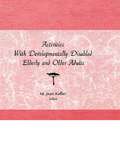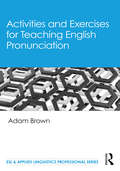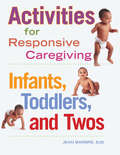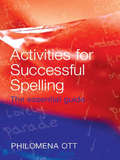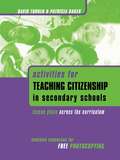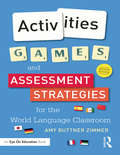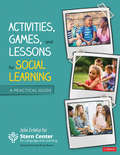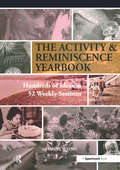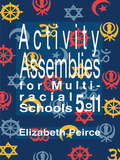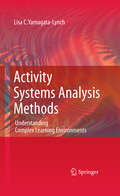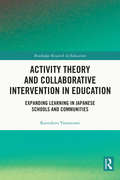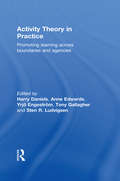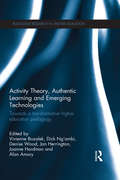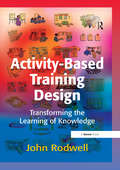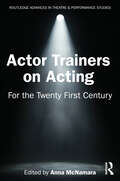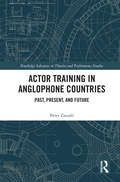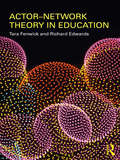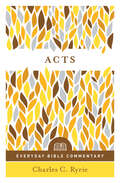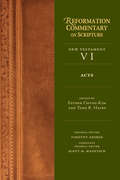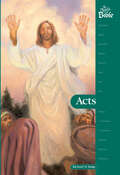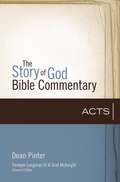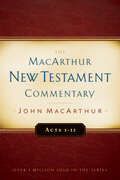- Table View
- List View
Activities With Developmentally Disabled Elderly and Older Adults
by M Jean KellerLearn how to effectively plan and deliver activities for the growing number of older people with developmental disabilities. Activities With Developmentally Disabled Elderly and Older Adults is an innovative new book that aims to stimulate interest and continued support for recreation program development and implementation among developmental disability and aging service systems. Particularly useful for human service professionals working in the areas of developmental disabilities and aging, this practical volume will also be of interest to researchers, educators, and students interested in recreation services with older adults who are developmentally disabled.The older adult population with developmental disabilities (DD) continues to grow rapidly, yet little is known about their needs and interests. In this book a wide variety of authors share innovative and creative strategies for programming activities with older adults with DD. They focus on diverse issues, services, and programs from researchers, educators, and practitioners, represented varied disciplines. Each chapter demonstrates the diversity that makes serving a growing number of older individuals with DD both challenging and rewarding.Among the wealth of information you will find in Activities With Developmentally Disabled Elderly and Older Adults are discussions on the characteristics of this population and challenge activity professionals to seek innovative program strategies to appropriately serve individuals with DD companionship/friendship, physical functioning, and retirement adjustment issues that confront older adults who have lived with lifelong disabling conditions how a continuum of recreational activities is needed to provide meaningful experiences to elders with developmental disabilities how to design therapeutic recreation programs survey instruments that can be used to gain information about the needs of elderly persons with DD how to find specific programs and services that are age appropriate and foster creative expression and positive self-esteem a rationale for the development of integrated recreation programs
Activities and Exercises for Teaching English Pronunciation
by Adam BrownThis book is a practical, comprehensive tool for busy teachers or educators teaching English pronunciation. Brown puts pronunciation into perspective with other aspects of language, highlighting the importance of teaching pronunciation from the start. Applicable for both British and American pronunciation, this book is organized by aspects of pronunciation and includes a wealth of photocopiable worksheets to use in the classroom. The engaging exercises include rhymes, games, puzzles, narratives, and more, all designed to promote learner engagement and understanding. Each worksheet is accompanied by supplementary resources and guidance, including recommendations for modifying lessons for different English learner proficiency levels; instructions for the teacher and learners; correct or expected answers; and tips for teachers to extend and create their own exercises. The versatility and adaptability of this book make it a beneficial resource for teachers of ESL/EFL/EAL, as well as educational professionals who consult and oversee teacher trainer programs and courses in TESOL.
Activities for Responsive Caregiving
by Jean BarbreThe first three years set the stage for a lifetime of learning. This book provides more than eighty activities and experiences to optimize very young children's intellectual, social, emotional, and physical development, as well as strategies that support responsive caregiving.Jean Barbre, EdD, has thirty years of experience working with children and families as a preschool director, teacher, therapist, college instructor, national and international presenter, and guest presenter on public television.
Activities for Successful Spelling: The Essential Guide
by Philomena OttThis highly practical activity workbook is linked to the core text How to Manage Spelling Successfully and has been designed to support dyslexic students practise the spelling strategies and methods recommended in that book. This activity book can be used separately, or as part of an integrated programme for building students' spelling skills at home or at school. Suitable for mainstream classrooms, pupils undertaking additional literacy support in small groups, and for one-to-one teaching of individuals with specific learning difficulties including dyslexia, this excellent resource contains activities suitable for use at different stages of development, and for use with adults as well as school students. Each section contains a range of multi-sensory activities, including word searches, simple crossword puzzles and dictation exercises. This is an essential classroom companion for anyone helping struggling spellers.
Activities for Teaching Citizenship in Secondary Schools: Lesson Plans Across the Curriculum
by Baker, Patricia Turner, DavidA resource for teachers wishing to develop citizenship in their teaching activities. It provides activities for use in teaching, and includes lesson plans, photocopiable work sheets and guides to further resources.
Activities for Using the Internet in Primary Schools
by De Cicco, Eta Farmer, Mike (Senior Lecturer, University of Central England) Hargrave, ClaireThis text guides primary staff to Internet sites of value to the national curriculum Key Stages 1 and 2 offering appropriate ways of using ICT in the classroom. It contains practical activities, information and advice on developing and supporting class activities.
Activities, Games, and Assessment Strategies for the World Languages Classroom
by Amy Buttner ZimmerThis bestselling book is filled with fun activities you can use to engage students in learning a world language. No matter what language and grade level you teach, you will love having a wide variety of tools at your disposal, from quick warm-up exercises to longer games and group activities. Inside, you’ll find… Essential teacher tools and student organizational tools Strategies to promote and monitor class participation, including student self-assessments Strategies to promote and assess oral proficiency, such as prompts, quick chats, and role plays Warm-up activities and five-minute transitional activities Individual, pair, and group practice activities, with modification suggestions Games that make learning fun, with clear directions for how to do them Great websites and other resources to check out for more ideas The enhanced second edition features updated activities and technology suggestions throughout, as well as a tabbed design so it's easier to return to your favorite sections again and again. Bonus: The book comes with more than 30 templates—charts, rubrics, and game boards that can be photocopied from the book or downloaded as eResources from the book product page at www.routledge.com/books/details/9781138827295. You can modify and print them for classroom use.
Activities, Games, and Lessons for Social Learning: A Practical Guide
by Stern Center for Language and LearningIn these games, the prize is success in school—and life. Having good social skills doesn’t just affect classroom behavior—it’s the key to making learning stick. When students improve their self-regulation, social communication, and perspective-taking competencies, they are better prepared to challenge themselves academically, take on tough tasks, and collaborate with teachers and classmates to achieve real, lasting school success. And since these skills also improve life outside school, the benefits come full circle. Designed for both explicit instruction and "learning by doing," this practical guide provides hands-on activities that are easily adapted into any curriculum and can be used in general education, special education, after-school settings, and in the home. The design of each game keeps kids engaged and motivated, while educators benefit from clear, thorough explanations that unpack the complexities of social learning. Other behind-the-scenes features include: Evidence-based, teacher-tested lessons Anecdotes and real-world examples Links to relevant research Expansion ideas for applying learned skills to broader situations Templates and reproducibles for easy implementation This curated collection of activities puts social-learning theory into practice, helping even the most challenging children develop the social skills necessary for real success in school—and beyond.
Activities, Games, and Lessons for Social Learning: A Practical Guide
by Stern Center for Language and LearningIn these games, the prize is success in school—and life. Having good social skills doesn’t just affect classroom behavior—it’s the key to making learning stick. When students improve their self-regulation, social communication, and perspective-taking competencies, they are better prepared to challenge themselves academically, take on tough tasks, and collaborate with teachers and classmates to achieve real, lasting school success. And since these skills also improve life outside school, the benefits come full circle. Designed for both explicit instruction and "learning by doing," this practical guide provides hands-on activities that are easily adapted into any curriculum and can be used in general education, special education, after-school settings, and in the home. The design of each game keeps kids engaged and motivated, while educators benefit from clear, thorough explanations that unpack the complexities of social learning. Other behind-the-scenes features include: Evidence-based, teacher-tested lessons Anecdotes and real-world examples Links to relevant research Expansion ideas for applying learned skills to broader situations Templates and reproducibles for easy implementation This curated collection of activities puts social-learning theory into practice, helping even the most challenging children develop the social skills necessary for real success in school—and beyond.
Activity & Reminiscence Handbook: Hundreds of Ideas in 52 Weekly Sessions
by Danny WalshThis comprehensive guide provides a bumper book of original resource material for reminiscence and activities with older people for a whole year! Containing 52 sections of ideas and resource materials for each week of the year, this is an invaluable resource for activity organisers and group leaders in residential, day care and hospitals, and for anyone working with older people. There is a theme for each week, eg. Animals and pets, with corresponding ideas for social events, reminiscence, exercises and games, quizzes, art and crafts, as well as 'this week in history', good ideas', 'discussion topics', 'homework' and the option to personalise the week by recording local anniversaries and events alongside personal landmarks and details. The ideas are easy to use and are relevant for both groups and individuals, including those with mental health and cognitive problems. Some activities require some physical effort, others mental effort, but they are all adaptable to be fun and achievable. This book also includes an introduction to the nature and value of reminiscence and activities, and guidelines on 'how to do it'. Written by the author of "Groupwork Activities", this comprehensive resource provides hundreds of activity and reminiscence ideas - a fantastic resource.
Activity Assemblies For Multi-Racial Schools 5-11
by Elizabeth PeirceAims to provide a practical framework for multi-racial assemblies for children in primary school. It attempts to "inform" children about other people's beliefs. While some of the assemblies can be used straight from the book, other ideas require considerable preparation and guidelines are given.
Activity Systems Analysis Methods: Understanding Complex Learning Environments
by Lisa C. Yamagata-LynchIn the last two decades, there has been growing interest in pursuing theoretical paradigms that capture complex learning situations. Cultural Historical Activity Theory (CHAT) is one of several theoretical frameworks that became very popular among educational researchers because it conceptualizes individuals and their environment as a holistic unit of analysis. It assumes a non-dualistic ontology and acknowledges the complexities involved in human activity in natural settings. Recently, reputable journals such as the American Psychologist, Educational Psychologist, and Educational Researcher that are targeted for a wide-range of audience have included articles on CHAT. In many of such articles, CHAT has been referred to as social constructivism, sociocultural theory, or activity theory. Activity systems analysis is one of the popular methods among CHAT researchers for mapping complex human interactions from qualitative data. However, understanding the methods involved in activity systems analysis is a challenging task for many researchers. This difficulty derives from several reasons. First the original texts of CHAT are in Russian and there have been numerous authors who report on the difficulties of reconciling translation problems of the works of original authors' such as Vygotsky and Leontiev. Second, in North America activity systems analysis has deviated from the Russian scholars' intentions and Engeström's original work using the triangle model to identify tensions to overcome and bring about sociopolitical change in participant practices. Third, to this date there are numerous publications on the theoretical background of activity theory and studies reporting the results of using activity systems analysis for unpacking qualitative data sets, but there have been no methodological publications on how researchers engage in activity systems analysis. Thus, there is a dearth of literature in both book and journal publications that guide researchers on the methodological issues involving activity systems analysis.
Activity Theory and Collaborative Intervention in Education: Expanding Learning in Japanese Schools and Communities (Routledge Research in Education)
by Katsuhiro YamazumiBy applying cultural-historical activity theory and expansive learning theory to educational research, this volume illuminates new forms of educational activities as collaborative interventions in schools and communities where learners and practitioners generate expansive learning so that they can collectively transform their activities and expand their agency for themselves. It covers four cases of activity-theoretical formative intervention studies conducted in Japan, which are related to: fostering children’s expansive learning in classroom lessons; teachers as collaborative change agents in redesigning schools; expanding the school activity from below; and emerging knotworking agency in community-based disaster prevention learning. This book employs activity theory as a general theoretical framework of human learning and development to connect focal data from empirical and interventional studies on real human learning in specific educational settings in Japan. In this way, the book illustrates how the general theoretical framework could be used to understand a specific socio-cultural milieu, that is, the Japanese context. It also shows the universal relevance of the Japanese context of educational activity on broader international research, analyzing concrete empirical data from specific settings in Japan. In conclusion this book creates new understanding and develops a cohesive framework of the agentic and hybrid nature of educational activities as collaborative interventions in the expansion of learning.
Activity Theory in Practice: Promoting Learning Across Boundaries and Agencies
by Anne Edwards Harry Daniels Yrjö Engeström Tony Gallagher Sten R. LudvigsenThis ground-breaking book brings together cutting-edge researchers who study the transformation of practice through the enhancement and transformation of expertise. This is an important moment for such a contribution because expertise is in transition - moving toward collaboration in inter-organizational fields and continuous shaping of transformations. To understand and master this transition, powerful new conceptual tools are needed and are provided here. The theoretical framework which has shaped these studies is Cultural Historical Activity Theory (CHAT). CHAT analyses how people and organisations learn to do something new, and how both individuals and organisations change. The theoretical and methodological tools used have their origins in the work of Lev Vygotsky and A.N. Leont’ev. In recent years this body of work has aroused significant interest across the social sciences, management and communication studies. Working as part of an integrated international team, the authors identify specific findings which are of direct interest to the academic community, such as: the analysis of vertical learning between operational and strategic levels within complex organizations; the refinement of notions of identity and subject position within CHAT; the introduction of the concept of ‘labour power’ into CHAT; the development of a method of analysing discourse which theoretically coheres with CHAT and the design of projects. Activity Theory in Practice will be highly useful to practitioners, researchers, students and policy-makers who are interested in conceptual and empirical issues in all aspects of ‘activity-based’ research.
Activity Theory, Authentic Learning and Emerging Technologies: Towards a transformative higher education pedagogy (Routledge Research in Higher Education)
by Denise Wood Vivienne Bozalek Dick Ng’ambi Jan Herrington Joanne Hardman Alan AmoryAlthough emerging technologies are becoming popularised for teaching, learning and research, the relationship between their use and transformative effects on higher education remain largely unexplored. This edited collection seeks to fill this gap by providing a nuanced view, locating higher education pedagogical practices at an intersection of emerging technologies, authentic learning and activity systems. Providing numerous case studies as examples, the book draws from a wide range of contexts to illustrate how such a convergence has the potential to track transformative teaching and learning practices in the higher education sector. Chapters provide the reader with a variety of transformative higher education pedagogical practices in southern contexts, theorised within the framework of Cultural Historical Activity Theory (CHAT) and tool mediation, while using authentic learning as a pedagogical model upon which this theoretical framework is based. The topics covered in the book have global relevance, with research paying particular attention to South Africa, Australia and New Zealand, where the authors are based. The book will be of interest to educators, researchers and practitioners in higher education, as well as those interested in emerging technologies in education more generally.
Activity-Based Training Design: Transforming the Learning of Knowledge
by John RodwellActivity-Based Training Design shows you how to design new training sessions or transform existing sessions using tools and techniques that engage the participants, promote the effective learning of knowledge, and are fun to work with. It provides you with active reading techniques like Info Hunt, card-sort activities like Washing Line and ideas for games and activity boards like The Evaluation Game. This is not a set of pre-designed exercises that might or might not be relevant to the training you deliver. This is a set of methods and activities that are aligned with the principles of Accelerated Learning and can be applied to almost any knowledge-based training session. For each activity you will be able to read about how it works, why it works and the purpose and principles behind it. The book also describes how to prepare and run the activity and then provides examples of how the methods have been used on actual training events. Overall, this is a book that provides the tools and techniques for transforming a training session into an accelerated learning activity.
Actor Trainers on Acting: For the Twenty First Century (Routledge Advances in Theatre & Performance Studies)
by Anna McNamaraActor Trainers on Acting is a comprehensive, diverse and forwardthinking examination of the craft of acting written by leading experts from across the world.The book reflects on the evolving relationship between actor training and the contemporary and future world and considers how directly actor training relates to the living experiences of its stakeholders. Examining the training provider’s role in looking forward to a sustainable and resilient future, this book considers what opportunities there are to be created within performance training and what can be done to enable them. Seeking to provide those teaching, facilitating and leading performance training with ideas and practical steps, this book will be invaluable to students, teachers, practitioners and academics alike.Each chapter features an interview and reflection from leaders drawn from actor training resulting in innovative and insightful individual chapters. The progression is structured to consciously develop the central theme, outlining approaches to contemporary actor training that respond directly to our times globally, building on the foundations of traditions and utilising learning to embolden a confident and resilient training for future students, teachers and industries.
Actor Training in Anglophone Countries: Past, Present and Future (Routledge Advances in Theatre & Performance Studies)
by Peter ZazzaliActor Training in Anglophone Countries offers a firsthand account of the most significant acting programs in English-speaking countries throughout the world. The culmination of archival research and fieldwork spanning six years, it is the only work of its kind that studies the history of actor training from an international perspective. It presents the current moment as crucial for student actors and those who teach them. As the profession continues to change, new and progressive approaches to training have become as urgent as they are necessary. Using drama schools and universities as its subjects of inquiry, this book investigates acting programs in the UK, Ireland, the US, Canada, Australia, and New Zealand. Among the case studies are the Royal Academy of Dramatic Art, National Theatre School of Canada, Western Australian Academy of Performing Arts, and Carnegie Mellon University. All recognized for their distinguished reputations by industry professionals and acting teachers alike, the book examines each program’s pedagogical approach, administrative structure, funding apparatus, and alumni success. In doing so, it identifies the challenges facing acting schools today and offers a new direction for training in the twenty-first century. Actor Training in Anglophone Countries will be of interest to theatre and performance scholars, artists, students, and teachers.
Actor-Network Theory in Education (Education And Social Theory Ser.)
by Richard Edwards Tara FenwickActor-Network Theory (ANT) has enjoyed wide uptake in the social sciences in the past three decades, particularly in science and technology studies, and is increasingly attracting the attention of educational researchers. ANT studies bring to the fore the material – objects of all kinds – and de-centre the human and the social in educational issues. ANT sensibilities are interested in the ways human and non-human elements become interwoven. Since its first introduction, actor-network theory has undergone significant shifts and evolutions and as a result, it is not considered to be a single or coherent theoretical domain, but as developing diversely in response to various challenges. This book offers an introduction to Actor-Network Theory for educators to consider in three ways. One mode is the introduction of concepts, approaches and debates around Actor-Network Theory as a research approach in education. A second mode showcases educational studies that have employed ANT approaches in classrooms, workplaces and community settings, drawn from the UK, USA, Canada, Europe and Australia. These demonstrate how ANT can operate in highly diverse ways whether it focuses on policy critique, curriculum inquiry, engagements with digital media, change and innovation, issues of accountability, or exploring how knowledge unfolds and becomes materialized in various settings. A third mode looks at recent 'after-ANT' inquiries which open an array of important new approaches. Across these diverse environments and uptakes, the authors trace how learning and practice emerge, show what scales are at play, and demonstrate what this means for educational possibilities.
Acts (Everyday Bible Commentary)
by Charles C. RyrieThe book of Acts is a thrilling account of the early church discovering what it means to be Christian. Through the power of the Holy Spirit, they lived out a triumphant faith in the face of opposition and persecution, established order for the growing movement, and took the gospel to the ends of the earth. It&’s an exhilarating story, and there are even more treasures lying underneath the surface. Encounter the beautiful depth of Acts through enlightening verse-by-verse commentary from Charles Ryrie that&’s both straightforward and insightful. You&’ll gain:Important historical backgroundInsights from the original language Help with the difficult passages And more!You don&’t have to go to seminary to encounter God in exciting, new ways through His Word. Discover how much more enjoyable your personal study will be with understandable, quality Bible commentary for everyday life.
Acts (Everyday Bible Commentary)
by Charles C. RyrieThe book of Acts is a thrilling account of the early church discovering what it means to be Christian. Through the power of the Holy Spirit, they lived out a triumphant faith in the face of opposition and persecution, established order for the growing movement, and took the gospel to the ends of the earth. It&’s an exhilarating story, and there are even more treasures lying underneath the surface. Encounter the beautiful depth of Acts through enlightening verse-by-verse commentary from Charles Ryrie that&’s both straightforward and insightful. You&’ll gain:Important historical backgroundInsights from the original language Help with the difficult passages And more!You don&’t have to go to seminary to encounter God in exciting, new ways through His Word. Discover how much more enjoyable your personal study will be with understandable, quality Bible commentary for everyday life.
Acts (Reformation Commentary on Scripture Series #6)
by Esther Chung-Kim Todd R. HainsPreaching'sReformation Commentary on Scripture,
Acts (The People's Bible)
by Richard D BalgeWhat is the book of Acts about in the Bible? Who wrote Acts?Luke wrote the book of Acts as a continuation of his gospel. In this book, Luke recorded the growth of the early Christian church after Jesus ascended to heaven. The first part of the book records the growth of the church in and around the city of Jerusalem. Luke then goes on to record the apostle Paul’s conversion and the spread of the gospel message throughout the Roman world.Want to learn more? If you’re wondering what the book of Acts is all about, this helpful resource is for you!Acts is a reliable Bible commentary. It’s down to earth, clearly written, easy to read and understand, and filled with practical and modern applications to Scripture.It also includes the complete text of the book of Acts from the NIV Bible. The Christ-centered commentaries following the Scripture sections contain explanations of the text, historical background, illustrations, and archaeological information. Acts is a great resource for personal or group study!This book is a part of The People’s Bible series from Northwestern Publishing House.
Acts (The Story of God Bible Commentary)
by Dean PinterA new commentary for today's world, The Story of God Bible Commentary explains and illuminates each passage of Scripture in light of the Bible's grand story. The first commentary series to do so, SGBC offers a clear and compelling exposition of biblical texts, guiding readers in how to creatively and faithfully live out the Bible in their own contexts. Its story-centric approach is idea for pastors, students, Sunday school teachers, and all who want to understand the Bible in today's world.SGBC is organized into three easy-to-use sections, designed to help readers live out God's story: Listen to the Story; Explain the Story; and Live the Story.Praise for SGBC:"The easy-to-use format and practical guidance brings God's grand story to modern-day life so anyone can understand how it applies today." -- Andy Stanley"Opens up the biblical story in ways that move us to act." -- Darrell L. Bock"It makes the text sing and helps us hear the story afresh." -- John Ortberg"This commentary breaks new ground." -- Craig L. Blomberg
Acts 1-12 MacArthur New Testament Commentary (MacArthur New Testament Commentary Series)
by John MacArthurThese study guides, part of a set from noted Bible scholar, John MacArthur, take readers on a journey through biblical texts to discover what lies beneath the surface, focusing on meaning and context, and then reflecting on the explored passage or concept. With probing questions that guide the reader toward application, The MacArthur Bible Studies are invaluable tools for Bible students of all ages. The book of Acts is the first volume of church history. It records the story of the church from its explosive beginning on the Day of Pentecost to the imprisonment at Rome of its greatest missionary. During those three decades, the church expanded from a small group of Jewish believers gathered in Jerusalem to embrace thousands in dozens of congregations throughout the Roman world. Acts describes how the Spirit of God superintended, controlled, and empowered the expansion of the church. Although a work of history, not theology, Acts nevertheless emphasizes the doctrinal truths concerning salvation, the work and person of the Holy Spirit, and other theological issues. Join John MacArthur as he searches the pages of the book of Acts to uncover the intricacies of God's Word spoken to His people.
